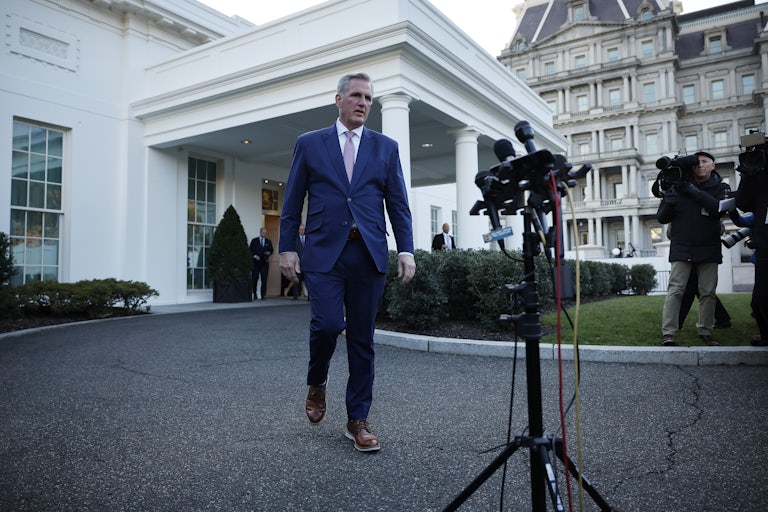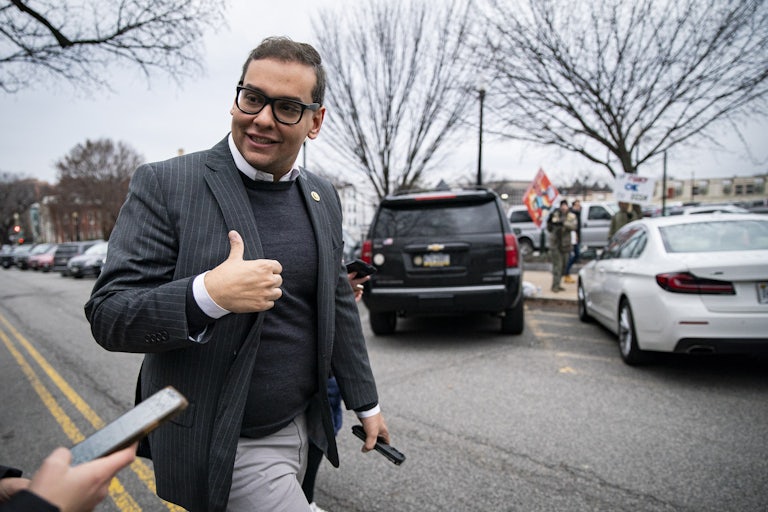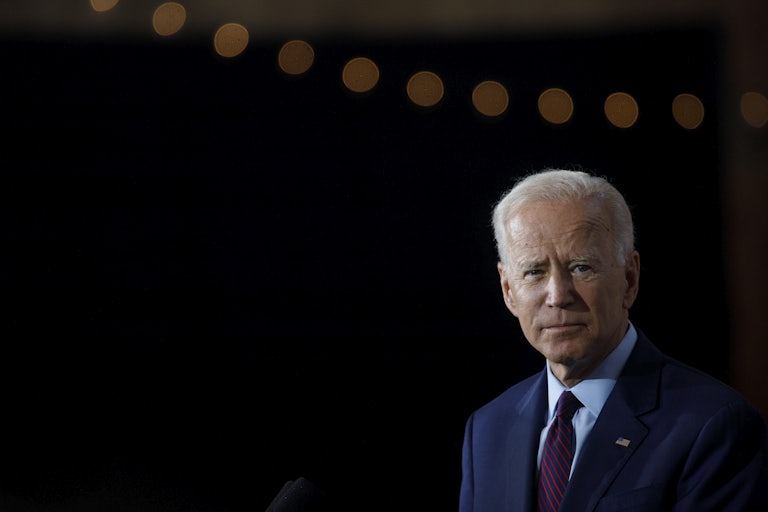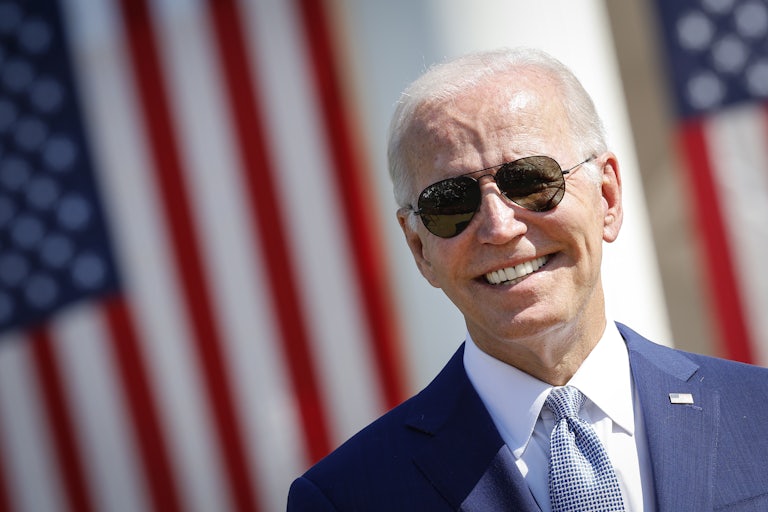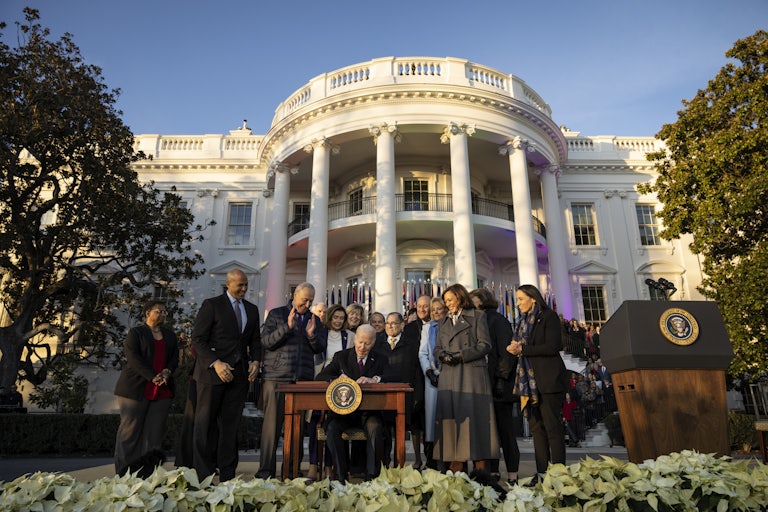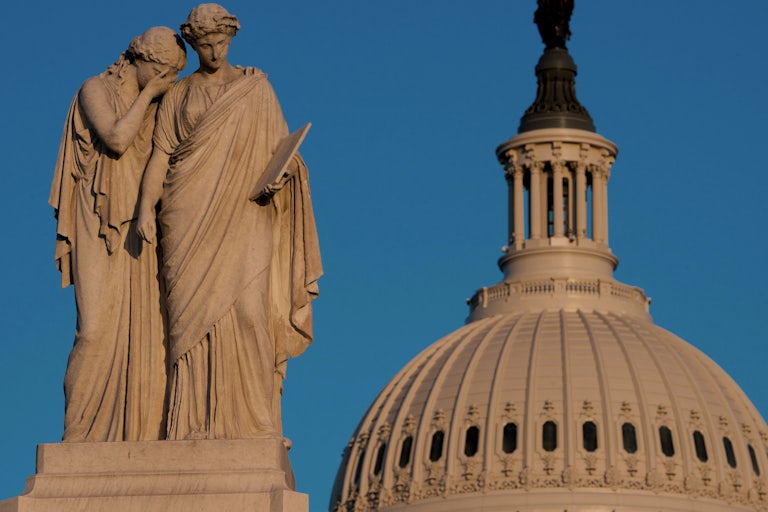The Case Against a Biden Run Is Obvious—and Weak
Democrats may fret over the president’s age, but they’re nowhere near ready to replace him.
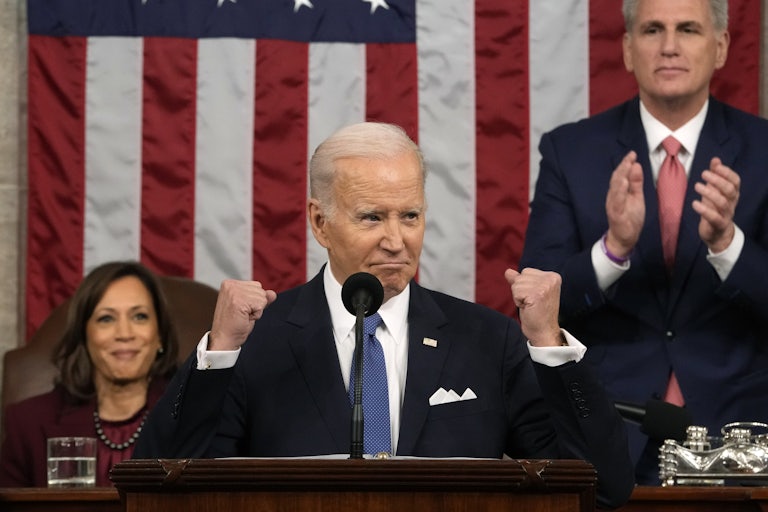
Did The New Republic’s Walter Shapiro just jinx the entire country? It seems as if I was just savoring the afterglow of his recent piece extolling the relative quietude of the pre-presidential primary season when all of a sudden, everything popped off. Nikki Haley announced her intention to run for president. Mike Pompeo put a toe in the water. Then Donald Trump accused Ron DeSantis of being a pedophile. So much for our sea of tranquility!
Still, let’s face it, this was inevitable: The Republicans are going to have a long and pyrotechnic skirmish to decide their presidential nominee. For those hoping for a similar spectacle on the Democratic side, however, reality provides precious little grist. But the world of hot takes and hypotheticals beckons. And this week, we got a classic of the genre in the form of a Michelle Goldberg piece titled, “Biden’s a Great President. He Should Not Run Again,” in which she takes 850 words to reiterate a point she’s already made: Joe Biden is really, really old.
I don’t necessarily want to dump all over this point of view. I share Goldberg’s concern about Biden’s age. When The New Republic’s editor, Michael Tomasky, solicited the opinion of Democratic insiders about whether Biden should run again, it was among their worries as well. Their consensus, nevertheless, was that Biden should run again. It makes sense: Biden’s age was a major concern when he announced his run in 2015. It remained a major concern when Biden’s two biggest rivals in that primary, Elizabeth Warren and Bernie Sanders, also turned out to be very old themselves. Democratic elites and primary voters stared right into the heart of these gerontological anxieties and, having weighed them fully, decisively nixed all of the more youthful alternatives that were running for president alongside their elders. So here we are.
It’s true that Democrats could, if they wanted to, pivot and act on that concern now by using a primary to reverse this prior decision. One major problem they’d face is the lack of compelling alternatives. Democrats have a lot of people on hand whom voters already rejected in favor of Biden. Two of them, Sanders and Warren, don’t solve the age problem. Vice President Kamala Harris barely rated in the 2020 primary and has historic troubles with Democratic Party elites. Most of the rest have done little in the intervening time to advance the idea they should seek higher office, and the prospects for some have only worsened: Beto O’Rourke got absolutely rinsed in his latest attempt to get elected to something.
What about the future? Goldberg claims Democrats have “a deep bench.” She’s only able to name two politicians, Gretchen Whitmer and Raphael Warnock. Take it from someone who watched the Virginia men’s basketball team crash into—and out of—the NIT last year: Two people is not enough for a “deep bench.” Whitmer is one of a few Democrats (I’ll spot Goldberg J.B. Pritzker and Josh Shapiro) who might well round into presidential form, given another few years of seasoning. The notion that Warnock should make an early departure from his hard-won Georgia Senate seat—especially after all he went through to secure it—to take on a quixotic bid for the White House in 2024 is one of the more ludicrous notions I’ve encountered in a while.
Besides, any attempt to solve the dilemma of Biden’s age by seeking a replacement will engender a problem of greater magnitude: It will inject the pre-primary season with a massive dose of unnecessary tumult. Even if Biden had to give way for a clear and obvious reason, the ensuing disarray would touch off a combative primary in an election cycle in which a unified purpose among Democrats couldn’t be more important.
And the pundits who’d sell such a switch as a brilliant tactical decision, as Goldberg has, can’t be counted on to ratify the wisdom of their directive after the fact. Remember: The political media are chaos junkies who treat conflict as catnip and would relish the crisis caused by Biden’s departure. Meanwhile, the lesson of the midterms is that voters are turned off by disarray. Biden’s own polling struggles reflect this: Nothing damaged his approval ratings more than the chaotic withdrawal from Afghanistan. He is still struggling to recover from that one moment when it did not appear that the adults were in charge.
But Afghanistan is instructive in a different way as well. The withdrawal may have hurt Biden’s numbers, but the fact that he was unwilling to keep paying the sunk costs of the Afghanistan scam was a real break from the status quo. Biden’s State of the Union address suggested that the president still has that yen for fresh thinking. As HuffPost’s Kevin Robillard noted: Clinton used his address “to declare the era of big government over, Obama used them to sell a grand bargain and a free trade deal.” Biden, by contrast, “used it to attack big pharma, rule out social security cuts, talk about antitrust policy, and declare the tax code unfair.”
This is a phenomenon that we’ve noted before: Many of Biden’s throwback instincts about the way America could be are incredibly well suited to the moment, and seem fresher than his predecessors’ ideas. Would-be Biden successors should take heed, because at the moment it’s Biden who sounds most like a bona fide party standard-bearer and a better tribune of the middle class than any of the GOP’s weird culture warriors, and more prepared to battle the larger universe of chiselers and cheats who have gotten away with nickel-and-diming ordinary Americans.
This article first appeared in Power Mad, a weekly TNR newsletter authored by deputy editor Jason Linkins. Sign up here.

